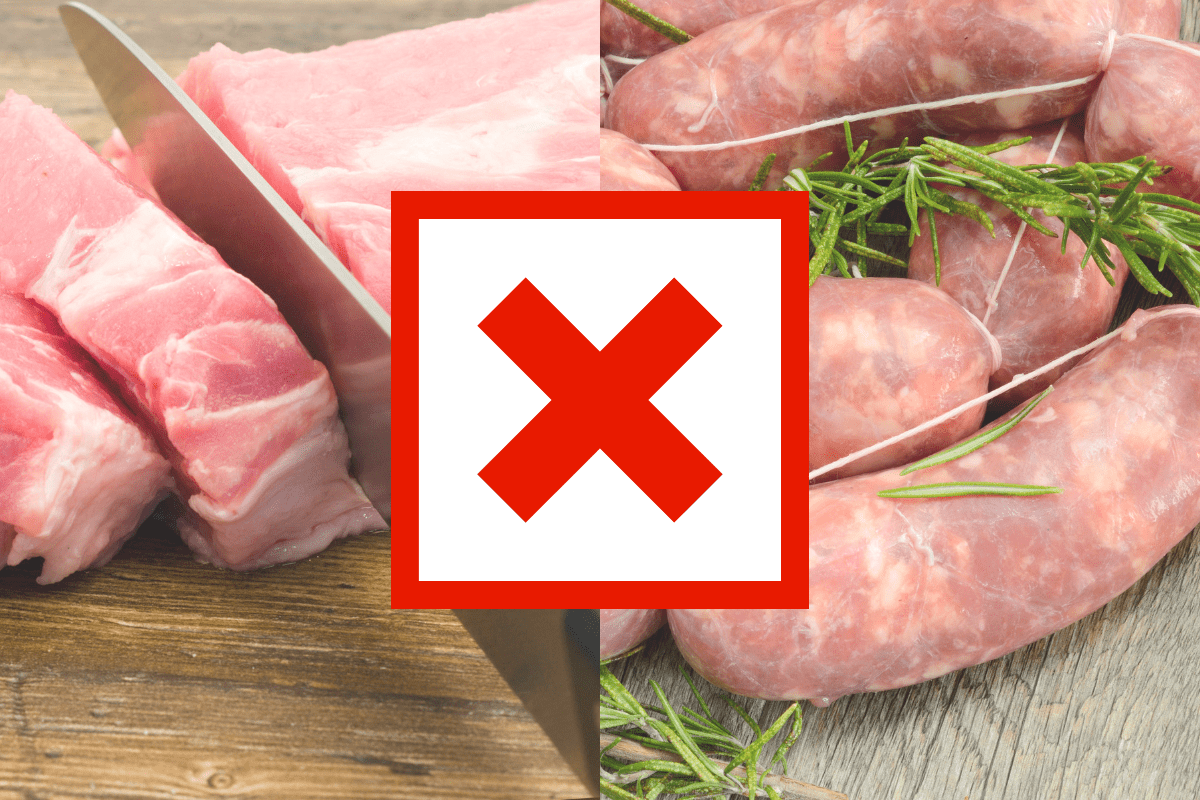You may have seen a lot of restaurants hanging the sign “No Pork No Lard” instead of a halal sign in many premises or establishments.
What does it mean by that? Let’s check it out.
No Pork, No Lard
Meaning of No Pork No Lard
No pork, no lard means that the dish or recipe does not include any pork or lard products.
Lard is a rendered fat made from pork fat. It is used in many flavour, texture, and cooking oil recipes.
Avoiding pork and lard makes the dish suitable for Muslim or people who do not eat pork or pork products.
If ‘No Pork No Lard’, Is It Halal?
No, ‘no pork, no lard’ does not guarantee a halal product. Halal products must meet specific criteria, including being prepared following Islamic dietary laws.
No pork and no lard are enough to guarantee a product is halal. For a product to be considered halal, it must also be made with ingredients permissible under Islamic law.
It includes animal sources slaughtered according to Islamic law and components free of prohibited substances, such as alcohol, pork, and lard.
Additionally, the product must be prepared in a halal-certified kitchen and not be contaminated with prohibited substances.
Why Muslim Cannot Eat Pork
If you’ve ever wondered why some Muslim mates don’t eat pork, this article is for you. It’s not just that they don’t like the taste of it – there are religious reasons behind their decision to avoid pig meat.
It all comes down to one major religion: Islam. Nowadays, over 1 billion people practice this faith worldwide, and many of its followers adhere strictly to dietary laws set out by the Quran.
According to these rules, eating pork is considered haram (forbidden) as Allah has declared pigs unclean animals. This means no part of the animal should be consumed or even touched by believers – from snout to tail!
But it’s not just about following orders; avoiding pork carries deeper meaning in Islamic culture and spirituality. For starters, consuming forbidden foods goes against the values of cleanliness and purity, which are highly important in Islam. Additionally, refraining from eating pork shows respect towards God’s creation and reinforces Islamic values such as compassion for living creatures.
Reasons For Not Eating Pork In Islam
We Muslims can’t eat pork for a few reasons.
Firstly, in the Qur’an – Allah says that eating pork is an abomination and we should stay clear if we want to be devout followers.
Secondly, pigs are scavengers, so they eat almost anything – including rubbish. This means their meat could have potentially harmful bacteria, which puts us at risk of getting sick if we consume it.
Finally, swine must be cleaner than animals like cows or chickens, explicitly bred for human consumption. So all these things combined make us steer away from pig products altogether!
Hygienic Considerations
Right, so another reason Muslims don’t eat pork is its hygienic concerns. Pigs are scavengers, and they’re known to carry many diseases that can be transferred to humans if we consume them – not ideal!
Plus, pigs aren’t able to sweat like other animals, so the toxins in their bodies tend to build up more quickly, which makes them unclean. This means those who eat pork need to ensure it’s cooked well. Otherwise, you could end up with an upset stomach or worse!
Another thing about pig meat is that it needs to be guaranteed where it comes from or what else has been added. Unless you know precisely where your pork has come from and how it was prepared, you could consume something dangerous for your health. And let’s face it, none of us fancy ending up in the hospital after chowing down on some bacon sandwiches!
So yeah, although eating pork isn’t forbidden in every religion out there, Islam teaches against it due to all these hygiene risks – better safe than sorry. All this being said, there are still plenty of tasty alternatives available such as chicken and lamb, that won’t put our health at risk.
Spiritual Implications
Muslims don’t eat pork as they believe it’s forbidden in the Qur’an. It says that any type of swine is impure, so eating it would be a sin against Allah. This spiritual concept has existed for centuries and remains an essential aspect of many Muslim beliefs today.
The idea behind this prohibition is based on the fact that pigs are unclean animals according to Islamic law. Not only does the Qur’an forbid their consumption, but other religious texts do, too – such as Hadith and Sunnah.
These teachings suggest that Muslims abstain from consuming pork because it could harm one’s health if not cooked properly or ingested in large quantities. As well as this, there is also a symbolic element to the ban; by avoiding something considered ‘unclean’, Muslims can demonstrate faithfulness towards God and His laws.
It’s clear why those of the Islamic faith don’t eat pig meat: spiritually speaking, it’s prohibited by both scripture and tradition. But beyond these reasons lies an even more powerful message about respecting what you’re given and following divine guidance no matter how hard it may seem.
Conclusion
As we said, there are a few reasons why Muslims don’t eat pork. It’s all down to hygiene and spiritual implications.
It’s not our place to judge anyone for how they choose to live, whether eating or abstaining from pork. We should respect everyone’s individual choices – even if we don’t always agree with them! But hopefully, this article has given you some insight into why Muslim people may choose not to consume pork products.
It shows that religion can shape many aspects of daily life, no matter which faith somebody follows. So let’s all try to be more mindful when respecting each other’s beliefs and traditions!
After all, we’re all human and share more similarities than differences.

